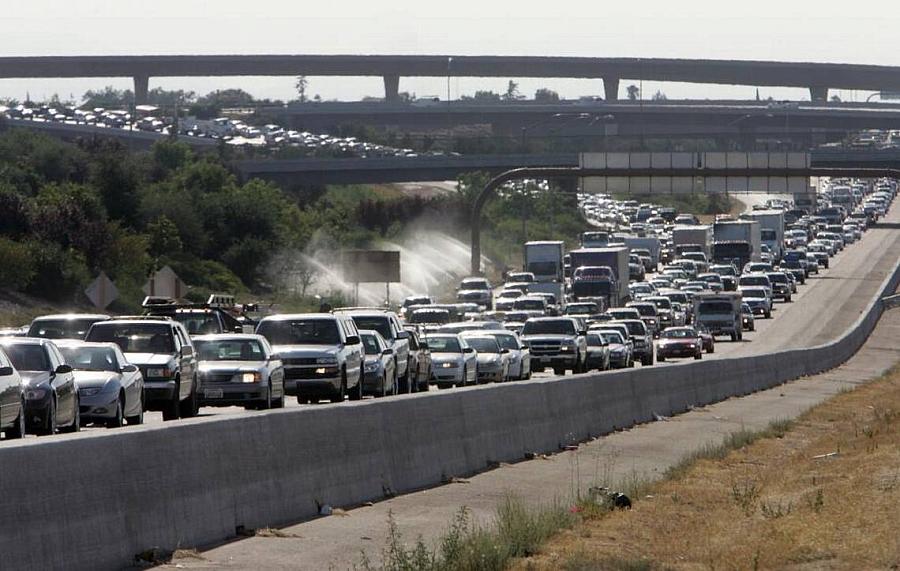Fresno’s transportation problems are stifling health and economic opportunities

Traffic at the 41 and 180 freeway interchange in Fresno, California.
(Photo via Danielle Bergstrom and Maria Ortiz-Briones)
A three-hour journey on two buses to a doctor’s appointment.
A long walk home on unsafe streets in the middle of the night.
A walk to school through a muddy field.
For many of Fresno County’s working class and immigrant communities, these are their only options to get around.
The county has grown to a metropolis of 1.1 million people, yet people who take public transportation still have more than double the commute times of those who drive their own cars.
This isn’t by accident — it’s by design.
For 35 years, Fresno County’s Measure C, a half-cent sales tax dedicated to transportation, has dramatically shaped the landscape of metropolitan Fresno. Fresno County now has one of the highest number of freeway lane miles per capita in the country, leaving car commuters with lower-than-average commute times on widely designed freeways. Not so for bus riders, the majority of which spend more than 45 minutes or an hour on their commute.
The freeway-heavy investments have enabled an entire generation of suburban sprawl north and east out of Fresno into Clovis and up into the Sierra foothills, following the brand-new 41, 168, and 180 freeways. Many service and retail jobs have followed, leaving workers with hours-long commutes to get from more affordable south Fresno neighborhoods to the northeastern suburbs.
The majority of the region’s new housing gets built in these new neighborhoods, whether or not other amenities like grocery stores or doctors’ offices are within a close distance, creating even more traffic.
And as new freeways make previously cheap farmland desirable for housing tracts, those with the foresight — and political connections to sway future transportation funding — reap millions in profits. Developers have learned that shaping future transportation investments is key to making the business model work.
Despite an increase in local transportation fees to ensure new development pays its fair share of local roads, those fees never cover the true cost of road expansion, leaving taxpayers with the rest of the multimillion-dollar bill, if the improvements ever get made.
And if they don’t? Pedestrians and drivers have to deal with dangerous, bottlenecked roads on the fringe of the city.
Politicians push for state and federal grants to cover the cost of road widening in new suburban areas, even as rural residents ask for more funding to be set aside for sidewalks in farmworker communities.
Public health has often taken a backseat in transportation policy conversations in Fresno County, and its presence — usually centered around the air-quality impacts of freeway and road expansion — has been considered only after litigation and significant advocacy efforts.
Fresno still has some of the worst air quality in the nation, according to the U.S. Environmental Protection Agency. Health disparities are stratified by race and income, with predominantly Black and Latino communities bearing the brunt of the worst air quality, and with significantly lower life expectancies as a result.
In south Fresno, one census tract is designated the most polluted and economically disadvantaged in California, according to the state’s CalEnviroScreen methodology — and it also happens to be bisected by two major freeways and is the hub of the region’s growing warehousing industry.
The consequences for residents can be disastrous: missed doctors’ appointments, overpaying for a taxi during a child’s asthma attack, losing a job because the bus was late too many times.
Measure C, passed by voters in 2006, doesn’t expire until 2026. But work has already begun to explore putting a new version of the sales tax on the ballot as early as November 2022.
Transportation equity advocates have already assailed the current process for its lack of transparency and commitment to rectifying past challenges created by the freeway-heavy system.
Whose needs will be prioritized this time?
With support from the 2021 California Fellowship, Fresnoland, the Fresno Bee, and Vida en el Valle are collaborating on a series of stories driven by community engagement, to explore, engage and explain the past, present, and future of local transportation investments through the lens of Fresno County’s Measure C renewal process.
We’ll talk to residents across the county to better understand their transportation needs. We’ll investigate current transportation programs and investments to see what’s working, and what isn’t. We’ll explore how other communities have found solutions to these transportation needs. And we’ll explain how residents can impact the process.

